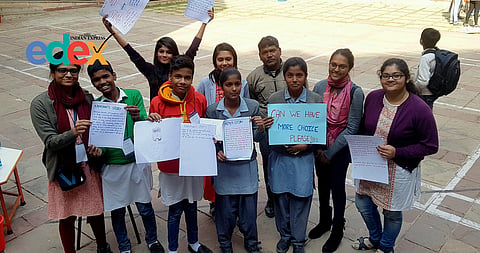

Lisa (Name changed), a development sector professional, has a steadily growing career, working in programs supporting women’s health, education and community participation. She is travelling to different parts of India and gaining a fulfilling experience all the while strongly contributing to her family.
But this journey hasn’t been straightforward for her. She had to navigate being pressurised to study science in 11th grade, performing poorly and repeating her year with humanities. She was also lucky enough to find a supportive network for herself through a career guidance program running in her community- mentors who encouraged her interest in pursuing bachelors in social work, taking up internships and fellowships to build her skills and chart her career.
Dipti, another young professional in the IT sector, had a similar journey, from having to study humanities in school due to her board exam marks, to realising that she actually has strong analytical skills and finding an opportunity that enabled her to study software development based on an aptitude test instead of traditional schooling history.
Both Lisa and Dipti narrowly missed being part of the ‘unemployable’ youth numbers that are such a large part of India’s narrative about its young people. In a traditional sense, Lisa- a high performing science student, and Dipti, an academically struggling one could have landed up in the same pool of dissatisfied youth, if they had not found opportunities that matched their strengths.
Lisa and Dipti’s stories are a deviation from the general experience of our youth. Only 45.9 per cent of graduates were found employable based on the India Skills Report 2021. Every year more than five lakh youth sit for the UPSC exams for a mere thousand jobs, investing years of their lives in exam preparation for a 0.2% chance at success, instead of building skills for other careers. These stats raise the question- are India’s youth really ‘unemployable’ or do we, as a society, need to enable better matching to pathways that suit one’s interests and aptitudes?
In my years of engaging with young people across urban India like Delhi and rural areas such as Jhajjar, Haryana, one of the common themes behind the pursuit of entrance exams such as the UPSC (for civil services) or NEET (for medical), was not a passion for the work, but a lack of understanding of what else they could do to build a respectable life for themselves and their families. Our education is not creating any experiences for students to explore diverse pathways, and for those from under-resourced communities, there are hardly any role models or family networks to learn from.
We need to urgently do more as a system to change this narrative and incorporate career exploration into the schooling and college experience. A young person’s career choices are impacted by multiple actors around them, hence when I’m saying system, I include everyone- from civil society organisations and industry, as well as the policy makers and teachers of the education system for both school and college, who must come together to support our youth.
The guidelines under National Education Policy 20202 are a promising start towards a holistic school experience with critical focus on both socio-emotional skills and access to non-academic activities such as arts, sports, entrepreneurship etc. The government needs to allocate higher budgets to the schools so they may get the resources needed to introduce such activities to students.
Two simple and resource light activities that we incorporate in our career guidance work at Alohomora Education Foundation3, is empowering teachers to:
Give students micro career projects to do at home during their high school years. For example if a student is interested in joining the police force, they go find an officer in their community and interview them about their work. This helps students get a realistic sense of whether they genuinely feel this career pathway would be a good match for them.
Conduct ‘Role Model Interactions.’ where they invite a variety of local professionals to schools to share their journeys with students. Calling local farmers, or alumni students who have set up their own tailoring shops along with those pursuing degrees from prestigious universities sends a message to students that they need to find what suits them best, and all kinds of career pathways are possible.
These initiatives help students gain the experience they need to make more informed choices for stream selection in 11th grade and pick relevant higher education courses bridging the gap between education and employment.
The industry also needs to do more to mentor students to make career pathways real, especially for rural youth. The recently launched PM Internship scheme might be a step in the right direction, if implemented well. It can open up ways for professionals to mentor youth in college and also help them see the path beyond entry-level roles. The internship may also empower students to understand if they are suited to the job they experienced and give them time in college to build skills needed for any alternate choice they might have.
India has 33 crore young people at the age of 15-29 years, each with the potential to shape our country’s growth and future. Yet, the conversation about them is often more about frustration than hope. To change this, government institutions, educators, civil society, and industry must join forces to create experiences for young people that enrich their learning. By helping them discover their strengths and plan their career pathways, we can inspire the emergence of many more “Lisas” and “Diptis” — youth who are ready to lead and contribute meaningfully to India’s progress
